A secret history of child abuse
- Published
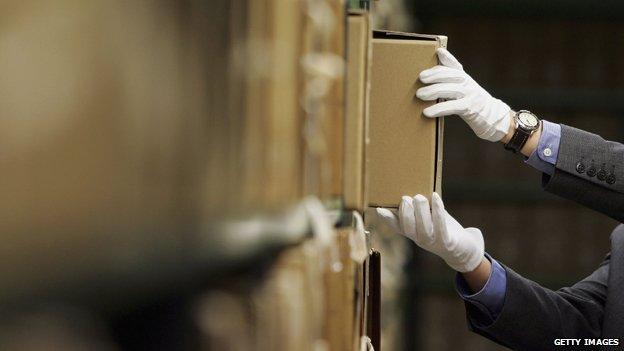
A major inquiry has been launched into how historical allegations of child abuse were handled. The UK's National Archives contain some appalling examples of abuse at children's homes and approved schools from decades past.
In 1952 the Home Office gave clear guidance to managers of these schools - saying they had a duty to report allegations of crimes, including "indecent practices", to the police.
But the files show that didn't always happen.
The files - dealing with cases that the Home Office was alerted to - show how abuse was not taken as seriously as today, and how at least one institution wanted to allow a convicted abuser to return to work with children after his sentence had been completed.
All of the cases in these files deal with attacks on boys at homes or schools. Approved schools - somewhere between a children's home and a youth detention centre - were disproportionately male.
Here are a selection of some of the most significant cases we have found in the files.
Westfield Children's Home, Liverpool, 1965-6
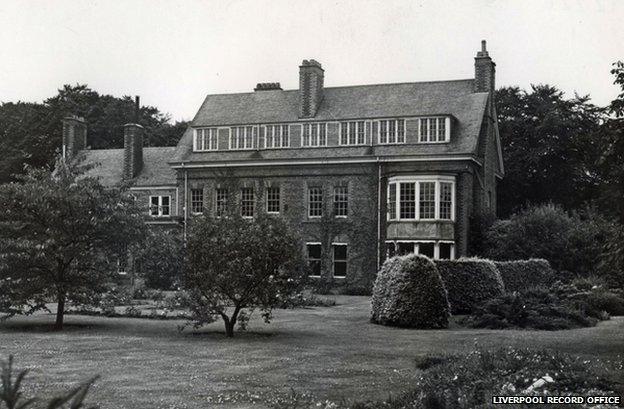
Westfield Children's Home occupied this building from 1953 (photo taken 1952)
Westfield was a local authority children's home with 26 children, aged six-16, mostly from "disturbed" backgrounds. In September 1965, a young housemaster was found guilty of buggery [the offence of male rape did not exist then] and indecent assault against several of the boys, and sentenced to four years in prison.
In court, the judge said "the state of affairs in this home can only be described as shocking" - and there was an outcry in the city. Many called for a public inquiry. The files show that the Home Office was not enthusiastic about this - and officials were relieved when the council decided to hold an inquiry in private, led by a QC, G W Guthrie Jones.
Guthrie Jones found that this was a "well-run home", with high household standards, regularly inspected by the Home Office, as all such institutions were.
He pointed out that the boys concerned had been involved in sexual activity with other boys in the past. The youngest boy, particularly, had been "buggered" by other boys, Guthrie Jones said. The first incident, recorded in 1962, was when he was only eight years old.
The convicted housefather had no record of homosexuality, Guthrie Jones noted. "It is plain that if a man, particularly unmarried, lives in such a community the strictest supervision is required. Indeed, it is possible that such a man might himself be in one sense the victim of boys who had already been corrupted."

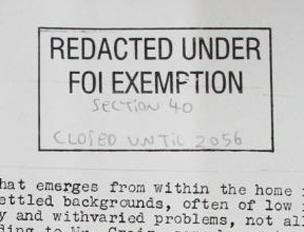
The archive files
Much of the research leading to this piece was originally done by Sanchia Berg and Meirion Jones for an episode of Panorama about Mandatory Reporting and Child Abuse in November 2013: After Savile: No more secrets?
Some of these documents had passed into the archives under the 30-year rule
Some files released to the BBC after many FOI requests.

Such a comment really illustrates the difference between attitudes then and now - though the files do show there were a small number of other cases where officials and police really did try to prosecute abusers.
The "sexual behaviour" of the youngest boy at Westfield had been discussed by doctors and council workers the year before. The council had considered moving him - he'd been in care since the age of five. But they decided another children's home was out of the question, as they didn't want to "spread" such behaviour, and they couldn't find foster parents for him.
Guthrie Jones made several recommendations - for instance, that boys "known to be indulging in homosexual practices" should not sleep in the same room. He suggested better staff selection and training as well as more use of doctors and other specialists.
"This was a shocking and appalling case and the way in which it was dealt with 50 years ago is a stain on the city's child welfare record," says Councillor Jane Corbett, Liverpool City Council Cabinet Member for Children's Services. "There has rightly been a seismic shift in attitudes since then, coupled with the introduction of rigorous safeguarding policies."
The Ockenden Venture, 1965
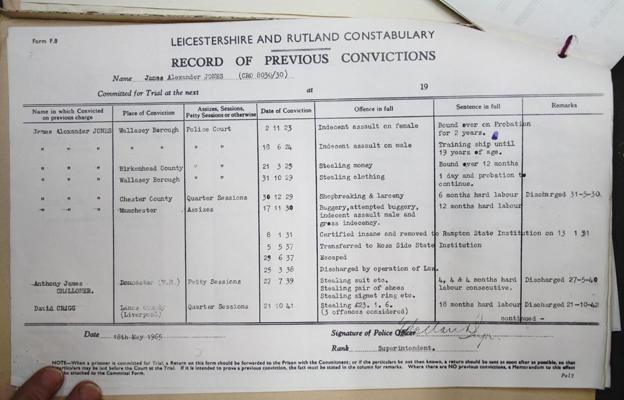
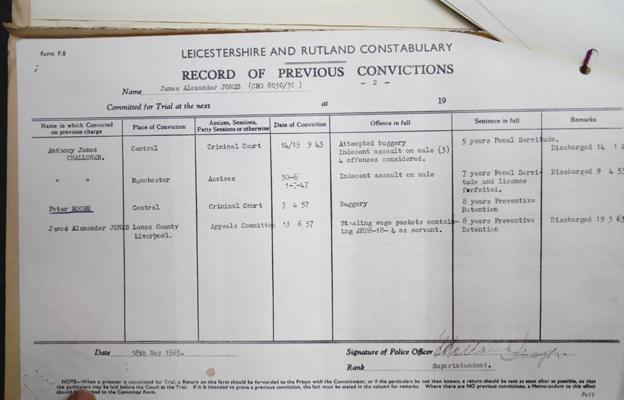
In June 1965 Peter John Moor appeared in court in Leicestershire, and was found guilty of two offences against young boys who were resident at Donington Hall. They were refugee children, apparently aged 11 and 14. Their identities are protected - but they would most likely have been Polish or from the Baltic states.
The Ockenden Venture had been set up some years before to cater for the children of stateless families - many still living in camps years after the war ended.
Moor had been a housemaster there, employed for only a few weeks. It emerged that he had resigned from two previous teaching jobs. More importantly, he had a long string of convictions for buggery, theft and indecent assault. He had first been convicted at the age of 15, in 1923, for "assault on a male". In 1957 he had been sentenced to eight years in prison for a sexual assault on a 15-year-old boy.
Moor had been able to move around freely simply by changing his name. The Home Office did hold a register of persons unsuitable to work with children - but he'd dodged that.
Officials agreed this was a "disturbing case" but felt that there was little that could be done. They reminded institutions they should always check references. "All this goes to show that no system is foolproof," wrote one senior official in the Home Office. The file makes clear that Ockenden, catering for some of the most vulnerable children in England, had been targeted before. The headteacher had called the regional inspectors directly on this occasion because of "former allegations of indecent behaviour by a housemaster in 1962".
"Ockenden has been shocked and appalled by the allegations of abuse highlighted by the media," say the trustees in a statement. "Historically, as part of its remit to assist refugees and displaced persons, the charity used to run children's homes. Having received a complaint about a housemaster at the Donington Hall children's home in 1965, the charity immediately contacted the police. The housemaster was suspended and ultimately, convicted and imprisoned. It subsequently transpired that the housemaster had obtained his position at Donington Hall by disguising his true identity and his former convictions."
St Gilbert's, Christian Brothers school, 1963
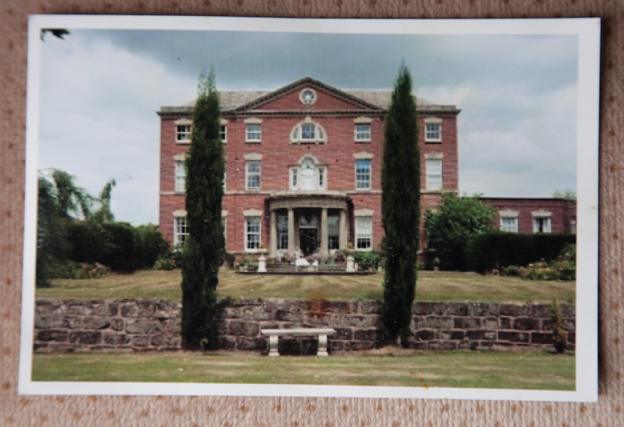
The Christian Brothers, or De La Salle Order, ran several approved schools in England. The approved schools were the ultimate responsibility of the Home Office - children were sentenced to terms there by juvenile courts. They catered generally for boys who'd committed relatively minor crimes. Their intention was reform.
Ian McCallum was sent to St Gilbert's, near Kidderminster in Worcestershire, when he was 13, after his home life became very difficult. McCallum was something of a rarity at St Gilbert's - a boy who'd passed the 11-plus.
St Gilbert's was harsh, he says. Boys were beaten so badly their backsides were black with bruising. He remembers how - soon after he arrived - he awoke to find seven of the ten other boys in his dormitory had run away. The boys were badly caned on their return.
Ian McCallum speaks to Sanchia Berg
McCallum vividly recalls the night he woke up to find Brother Maurice, the deputy headmaster, leaning over his bed. He woke up with a start - and the monk leant back, claiming nothing happened.
The files in the National Archives show that in 1963 a mother had complained to the police about the behaviour of one of the brothers. The name is redacted, but the context, and research by the BBC, indicates it was Brother Maurice. It shows that there had been earlier complaints about this monk - and the head of the order had moved him to Scotland. The order had also taken legal advice, indicating that they did not need to volunteer any information to the police.
In January 1964, Brother Maurice pleaded guilty to six counts of indecent assault against boys at the school. He was sentenced to three years' probation, on condition he spent 12 months as an outpatient at St Bartholomew's Hospital.
Five years later, the order wanted to place Brother Maurice back in an approved school as a teacher. He had been reinstated as a teacher by the Department for Education and Science, according to the note in the file. He would have remained on the "register" - but the order would not normally check one of their appointments against that Home Office record.
Civil servants were concerned there might be some repercussions for Whitehall if the monk reoffended. "It seems to me that the S of S [secretary of state] might be open to some criticism if [name redacted] were to have a relapse and the order could represent that the Home Office were aware of their intentions to re-employ him and had not advised against it," wrote DJ Marks, a senior civil servant in the Home Office. They decided to express their reservations by phone - there's no note of what the outcome was.
McCallum is still shocked by the lack of care and concern for the children involved.
"There's no mention of anything about the children… He got three years' probation. What's three years' probation? And a year at a hospital just discussing his problems."
The De La Salle order now stresses that it has totally changed its approach to child safety in the light of the 2001 Nolan Report and the 2007 Cumberlege Commission Report.
"The De La Salle order condemns without reservation any action or behaviour that harms young people and, in particular, that perpetrated by one of its own members or employees. It apologises unreservedly to the victims of such behaviour."
Allegations are now referred to police and any alleged abusers immediately suspended. There are regular inspections.
"With regard to the specific question about St Gilbert's School in the 1960s, no member of the order involved in that school is alive today and the order holds no documentation with regard to how any allegations dating from that period were dealt with."
St Vincent's approved school 1948-9
St Vincent's was a junior school in Kent - for boys as young as eight or nine. It was a small school - run by nuns. In September 1949 several boys complained to the cleaning lady of "rude behaviour" on the part of one of the masters. When she asked more questions it was clear he'd been abusing them.
She reported this to the police. In this instance both the police and the Home Office acted quickly. A Mr Davey from the Home Office went to the school, accompanied by a number of police officers. The very next day, police interviewed all the boys in the school and decided there was a case against one of the masters. They had evidence from 10 boys that he'd abused them - and statements from a further 11 boys who were witnesses.
The police didn't stop there. They traced boys who'd moved on to other approved schools. Nine boys said they'd been assaulted by a master who'd left the school in 1948, two said he'd raped them. Five boys said they'd been sexually assaulted by a housemaster who'd also left the school.
Charges were brought against all three masters and they were tried in early 1950. The current master confessed to five counts of indecent assault and two counts of buggery, and was sentenced to two-and-a-half years in prison. It emerged that he'd left his previous job in a remand home after assaulting boys in a dormitory. The Home Office had warned St Vincent's about him, but the headmistress had ignored it. She'd even allowed him to take boys away from the school premises for "parties".
The other men denied the charges - no adult witnesses were called in the trial and the boys were easy to undermine. The men were found not guilty.
A spokesman for the Catholic Church in England and Wales says: "The church, learning from its failings in the past, now has robust national guidelines and procedures for the protection of children young people and vulnerable adults. It automatically refers allegations of abuse to the statutory authorities.
"However, we should not forget that victims and survivors of abuse of many years ago - like the boys of St Vincent's School - can experience pain and trauma on a daily basis."
Danesford Approved School, 1965
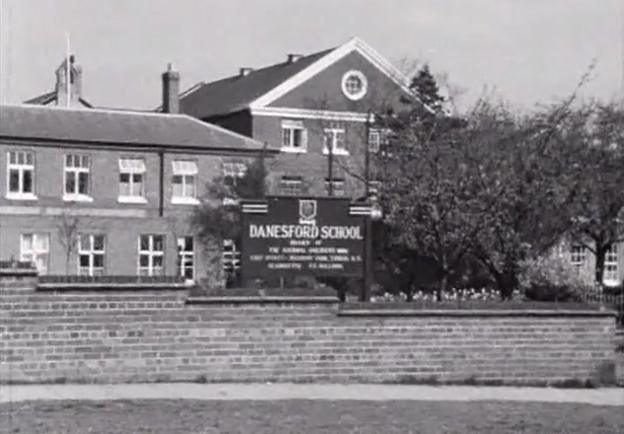
Danesford was another school for younger boys, including many vulnerable children. The first allegation of sexual abuse came from a mother who had heard that another boy had been "the subject of minor interference" by a member of staff. "She had expressed the hope that her son would not undergo the same treatment," the file says.
The complaint was investigated, and a master questioned. It emerged that the man had previously been warned about spending too much time alone with individual boys. "There was however no reason to believe that [name redacted] had any homosexual inclinations and the warning was intended to protect the staff member from possible allegations by boys exploiting the publicity value of such charges," the file says. It's a typical comment of the time, when complaints from children themselves were often considered suspect.
In this case, the boy was interviewed, and claimed he'd been repeatedly indecently assaulted by the master. The master was suspended and interviewed by police.
Danesford archive footage
"After first denying the allegations he broke down and confessed to offences against boys over a period of three years but mostly in the last few weeks," the file says.
The man became extremely agitated and the police "feared for his safety". The headmaster stepped in, offering him a room in his own house. The next day, he was driven to his parents' house. The file says he was sentenced to nine months in prison.
Six years later the Home Office were again contacted. A boy claimed that a master had "interfered" with him in the early hours of the morning. The school did not intend to call the police, believing that this was not a sexual assault. The Home Office agreed it was a minor matter - and "in the absence of any corroborative evidence it seemed unlikely the police would be able to prosecute".
"We are appalled by those who have abused the trust of the very children they should have been protecting," says a spokesperson for Action for Children. "The voices of children must always be heard - keeping them safe is our highest priority and we have robust procedures in place to do so."
The current inquiry
These files - and others that may now be uncovered - will surely be essential background reading for the new inquiry. The files reveal the attitudes of the time, particularly among government officials, responsible for the inspection of approved schools and orphanages - people who from today's perspective could have acted far more decisively to help vulnerable children.
"Child sexual abuse is a vile and abhorrent crime, no matter where and when it has been committed," says a spokesperson for the Home Office. "We are continuing to see appalling cases that show serious failings by public bodies and important institutions. That is why the government is establishing an independent panel of experts to consider whether these organisations have taken seriously their duty of care to protect children from sexual abuse."
Why there was such an apparently casual approach to the rape of these children over decades is hard to understand. As early as the late 1940s, some officials and police recognised the problem, and tried to act. In the most striking case, a senior civil servant wanted the then director of public prosecutions to confront the governors of one school that had covered up abuse.
However, most of the files show how many in power saw abuse as an inevitable - though unpleasant - feature of the system. And as Ian McCallum pointed out, there is virtually no concern expressed for the victims.
If you've been affected, the following organisations can help:
The police if you have evidence of having suffered sexual abuse so an investigation can be made
NSPCC charity, external specialises in child protection
National Association for People Abused in Childhood, external offers support, advice and guidance to adult survivors of any form of childhood abuse